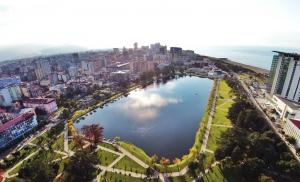Functions of airline representative offices. Job description of an airline representative How to become an airline representative
The representative office is created and operates for the purpose of:
Represent the interests of airlines at the airport (region);
Protect the interests of airlines at the airport (region).
In accordance with the set goals, the representative office solves the following tasks at the airport:
Organization of interaction of airlines with the airport, transportation sales agencies (customers of charter flights) and other airlines operating flights in the interests of the airline (interline, transfer);
Organization of interaction between airlines and federal and local executive authorities and other organizations on issues of organization and execution of flights (transportation and aviation works) and ensuring their regularity;
Ensuring that airline, airport and agency personnel comply with the rules and regulations established by the airline regulating aviation activities and the level of service;
Ensuring control and functioning of the air transportation sales system;
Ensuring the fulfillment of obligations of third parties in relation to the airline and protecting its interests.
If the airline does not have a permanent representative, his functions are performed by the pilot-in-command.
The rights and responsibilities of the pilot-in-command as a representative of the airline are defined in the airline's Flight Operations Manual.
Aircraft ground handling agreements
One of the airline's key objectives is to increase the efficiency of interaction with suppliers.
In practice, this means choosing reliable partners, improving methods of cooperation with them on a mutually beneficial basis in order to ensure high quality services provided.
This is especially important when organizing and conducting ground handling of aircraft, passengers, cargo and mail.
Airlines develop and regularly implement a program for the supervision and control of external ground handling service providers.
The purpose of this program is to ensure that all the above work is carried out in accordance with the requirements of the airlines and Federal agency air transport of the Russian Federation.
The fundamental document for preparing an agreement for ground handling of flights at foreign airports and foreign airlines at Russian airports is the IATA Standard Ground Handling Agreement and the guidelines of the Ministry of Transport of the Russian Federation on ground and technical services at airports of the Russian Federation.
Standard agreements are drawn up in accordance with IATA recommendations published in the “Airport Handling Manual”, the organization standard STO DOU 03-2003 “Documentation support for management. General requirements for the construction, presentation, design, content and designation of standards.”
To ensure that the quality of services provided meets the airline's standards, an SLA (Service Level Agreement) is drawn up, which is an official annex to the ground handling agreement signed between the service company and the carrier.
Types of flight services
The structure of air transport services consists of the following main areas:
a) service by scheduled flights (regular flights);
b) services on unscheduled flights (irregular flights);
| TYPES OF FLIGHTS |
| REGULAR FLIGHTS |
| IRREGULAR FLIGHTS |
Regular flights are carried out on specific routes, whether domestic or international. The airline operating these flights must have a government license for them or they must be state-owned enterprises (airlines and lines owned by governments).
Regular flights operate according to established schedules, regardless of the passenger load factors on these flights (although the flight schedule is adjusted by season - usually summer/winter). International scheduled flights are operated in accordance with the published schedule on contractual airlines based on air services agreements between contracting states. The schedule indicates the flight route, intermediate landing points, departure and arrival times, and each route point, frequency and type of aircraft. Changes to these conditions for the operation of regular flights can only be made with the mutual consent of the contracting countries.
Irregular flights are carried out on a one-time or group basis in accordance with special permission. Irregular flights, in turn, are divided into additional, special, charter and technical.
Additional flights are operated on the same airlines as regular ones, but on a special schedule. An additional flight may be carried out with the consent of the partner, provided that the load cannot be transported on the partners' scheduled flights. An additional flight, as a rule, is operated on the same day as the regular one, but in any case not later and not earlier than 24 hours from the time of the regular flight indicated in the flight schedule.
Special flights- for the transportation of officials, delegations, etc., are carried out according to the letter “A” with a special task, both along the route of regular flights and on a special route. As a rule, permission to operate special flights is requested through diplomatic channels.
Controlled flights are carried out along the route of domestic scheduled flights and have the letter designation:
- “GZ” - designate aircraft of departmental aviation (Ministry of Emergency Situations, Ministry of Internal Affairs, FSB, etc.)
- “K” or “M” - assigned to a regular flight indicating the name of a high-ranking official at the federal or regional level (respected people of the city, region).
Charter flights - for the transportation of a certain group of tourists or goods for hire, carried out on a commercial basis in accordance with a special charter agreement between the carrier (charterer) and the customer (charterer).
Charter flights operate outside the regular schedule. Usually these are seasonal or one-time transportation. A separate flight schedule is drawn up for them in addition to the regular schedule, in the intervals between slots(take-off/landing of a regular flight). In some countries interested in the development of charter flights, even special airports or terminals are opened for them (for example, in Istanbul, Turkey), which greatly facilitate the scheduling of charter flights.
Charters depend on factors such as aircraft load. If the plane is not filled to the estimated cost-effective level, the flight is cancelled. Therefore, charters usually involve renting an aircraft, as this allows the airline to avoid losses. But this places financial responsibility on the charter tenant. Charters can be passenger, cargo, large or small aviation etc.
Technical flights- for transportation of official cargo and personnel, as well as for flights and ferrying of aircraft.
5.4. Air transportation service market segments
To improve the quality of service provision in the field of passenger services, it is necessary to segment the air transportation market and carefully analyze the airline’s capabilities to develop the selected segments.
Air transportation service (AT) is divided into domestic and international air transportation, which, in turn, is divided into scheduled and non-scheduled transportation, which then includes passenger and cargo transportation. Within these sectors, the following market segments are noted:
Passenger transportation: Freight transportation:
Transportation of business passengers, - transportation of general cargo,
Transportation of non-business passengers - transportation of urgent cargo
Rice. 2. Air transportation market segments
When deciding to introduce a new service, each airline must know the characteristics and demands of each segment of the air transportation market and only take them into account to orient its production and commercial activities.
So for the market business passenger transportation have their own characteristics. Their age ranges mainly from 5 to 55 years. Between 10 and 30% of business passengers are women. Among them there are three subsegments:
individual trips businessmen at their own expense who require a high level of service that reflects their standard of living;
employee travel corporations at the expense of the company, in this case, both the level of service and the treats, souvenirs, and entertainment provided free of charge to passengers on an airline flight are of great importance;
incentive trips businessmen, when a group goes to a conference, symposium or on a business trip, combining business meetings with entertainment and relaxation. Tickets and hotel accommodations are booked in advance, and to reduce the cost of travel, passengers often use night flights.
For the first and second sub-segments the main requirement– this is the convenience of the schedule and high frequency of flights, the airline’s quick response to requests ; for the third - the determining factor is a high level of service and low cost of travel.
In recent years, significant changes have occurred in the business passenger transportation market. Previously, this segment of the service market was considered inelastic to price changes. At present, the share of individual businessmen traveling at their own expense, as well as employees of large companies who often fly on business trips, has increased. These passengers try to get discounts from the airline, usually through the frequent-flyer program. Consequently, price began to move up the list of priorities among business passengers.
Frequent-flyer program is a frequent flyer program that typically rewards you with points for every flight you fly on an airline, which accumulate and serve as the basis for ongoing discounts or a free ticket.
For example, in 2006 Aeroflot provided its regular passengers with the opportunity to receive a free economy class ticket when flying:
20,000 km - on airline flights within Russia;
30,000 km - on flights between Russia and Europe;
50,000 km - on flights to North America.
Some airlines use an incentive scheme when, during business trips, passengers accumulate points that give them the right to discounts, which are then used when traveling on vacation when paying for the cost of a trip, hotel stay, or car rental. Passengers often consider such a program a more important factor than the convenience of the schedule.
The use of various incentive schemes by the world's leading airlines, which generate a constant flow of passengers, mainly first and business class, makes it possible to fully implement the Pareto principle: 30% of an airline's passengers will provide 70% of its revenue. It is obvious that if there is a steady demand among regular customers for the services of a particular airline, its position in the air transportation market is much stronger than that of competitors who have not taken care to apply modern methods of commercial work in practice - linked marketing.
Market of passenger non-business transportation is divided into two sub-segments: tourist trips and vacation trips to visit relatives or friends. The demand for air transportation for both subsegments is determined mainly by the price level, but for the second subsegment the quality of service is of great importance.
To individual transportation of passengers for personal purposes There are two types of transportation:
Passenger trips related to unforeseen circumstances (illness or death of relatives, trips to visit them in disaster areas, etc.);
Traveling to and from work.
For the second category of passengers, demand is determined by the level of air fares, so their share is insignificant due to the high cost of air tickets compared to other modes of transport. As for the level of requirements of passengers of the first category, the most important for them is the convenience of the schedule, the frequency of flights and a quick response to the client’s request for a ticket on a specific route; the price of transportation is not of decisive importance here. Recently, the number of tourists who prefer to pay extra for an air ticket and have the opportunity to travel in business class has been increasing.
It should be noted that individual travel for personal purposes constitutes the smallest sub-segment of the passenger air travel market.
When operating in the passenger transportation market, airlines need to consider flight duration. Thus, the Boeing company conducted research, as a result of which it revealed different sensitivity of passengers to the schedule and level of service depending on the duration of the flight (Fig. 4).
Rice. 4. Structure of passenger traffic according to sensitivity to various factors
As can be seen from the figure, for flights lasting less than 2 hours, 60% of passengers respond primarily to the convenience of the schedule. Therefore, for short-haul airlines, you should choose small aircraft with a high frequency of flights and a convenient schedule. Since the air transportation market is short routes highly competitive, the wishes of passengers should be studied very carefully and taken into account. These include:
Separate check-in desk for fast service
and is confirmation of the passenger’s vital status;
Large transportation rate free luggage, priority loading it onto the plane, priority unloading and delivery to the receiving hall at the destination airport;
A separate waiting room equipped with fax machines and other office equipment, a separate lounge on board the aircraft for business class.
As the flight distance increases (duration more than 5 hours), passengers pay more attention to the comfort of the seat, cabin decor, noise level on the plane, on-board service, and service before and after the flight. In addition, this market subsegment is characterized by low price elasticity of demand, that is, a reduction in tariff does not lead to an increase in traffic volume.
A few words about the features of air cargo transportation, which include:
Heterogeneity of cargo;
Strong competition with other modes of transport;
High market monopolization;
Demand in the air cargo market is often one-sided.
When transporting goods, the main advantages of air transport are realized, namely high speed and quality of delivery, which significantly reduces inventory and warehouse costs of enterprises. And when transporting valuable, perishable and valuable cargo, air transport is often the only option.
It should be noted that analysis and forecasting of demand have very rarely been carried out for each individual market segment, although it is obvious that the demand for air travel for each segment is characterized by dependence on various factors. Consequently, for each segment you can build your own factor model for forecasting demand.
Speaking about future demand, we note the main factors that determine it: general trends in the development of the markets under consideration, the price of air transportation and the organization of transportation - the quality of service on board the aircraft and the level of pre-flight service. These and other issues are dealt with by commercial departments and airline marketing services.
We always present on our website large number latest current vacancies. Use filters to quickly search by parameters.
For successful employment, it is desirable to have a specialized education, as well as possess the necessary qualities and work skills. First of all, you need to carefully study the requirements of employers in your chosen specialty, then start writing a resume.
You should not send your resume to all companies at the same time. Choose suitable vacancies based on your qualifications and work experience. We list the most important skills for employers that you need to successfully work as an airline representative in Russia:
Top 7 key skills you need to have to get hired
The following requirements are also quite common in job vacancies: GoNow, SITA and Saber.
As you prepare for your interview, use this information as a checklist. This will help you not only please the recruiter, but also get the job you want!
Analysis of vacancies in Russia
Based on the results of an analysis of vacancies published on our website, the indicated starting salary, on average, is 29,000. The average maximum income level (indicated “salary up to”) is 52,500. It must be borne in mind that the figures given are statistics. The actual salary during employment can vary greatly depending on many factors:- Your previous work experience, education
- Type of employment, work schedule
- Company size, industry, brand, etc.
Salary level depending on the applicant’s work experience
Today, the functions of the representative office are undergoing changes, the processes of globalization of the aviation market and optimization requirements are beginning to affect them. But, along with evolutionary changes, a simplified opinion appears about their role on air transport. The latest catastrophic events over the Sinai bring us back to reconsidering views and stereotypes regarding representation in aviation production, and not only foreign ones. Let's try to retrospectively determine the significance and place of representative offices in providing air transportation.
The institute of representatives of the Soviet Aeroflot dates back to the distant 50s of the twentieth century. The first representative offices were opened in Berlin, Paris, Vienna, in the sixties in New York, Montreal, Tokyo, then all over the world. Representative offices have always been faced with difficult tasks, from opening them and providing Aeroflot flights to expanding commercial activities and growing sales in all areas of transportation.
It is difficult to imagine the difficulties with which flights on domestic aircraft were carried out abroad, especially to developing countries. Flights required provision of the necessary technical conditions for reception, service and preparation for departure. Since our aircraft were not well known in many countries, and the local airport infrastructure and equipment had different standards, the requirements became extremely difficult to meet. This concerned towing carriers, wheels, tires and spare parts for the chassis, communication equipment, special fluids with dispensers, which were imported from Moscow. To the detriment of commercial loading, planes flew with technical first aid kits.
To ensure the first flights, it was necessary not only to negotiate with ground services, but also to explain it competently in engineering, set the task, and make sure that this type of service meets the technical requirements of our aircraft and will ensure safe operation. These minimum requirements included refueling and compliance of aviation fuel, aircraft ground power supply, air launch devices, water quality and catering, cabin cleaning, toilet cleaning, as well as air navigation and airport services. The first representatives took responsibility for all aviation support, guaranteeing the safety of air transportation.
If you add to this commercial activity, organizing and conducting sales at confidential rates and in local currency, which require reporting on each ticket sold, and then overcoming national legal barriers to transfer foreign currency earnings, then, figuratively speaking, the pioneering representatives had to remove hat. In those years, there were few people with such knowledge and command of foreign languages. They became them in the process of work, making enormous efforts to simultaneously ensure aircraft production, comprehend foreign jurisprudence, languages and customs, often learning from their own mistakes.
The opening of the representative office was preceded by preparatory work in Moscow, but, anyway, representing your airline in government and commercial structures, establishing connections, concluding agreements, choosing banks, opening offices, ensuring the sale of transportation, servicing passengers and aircraft, all this has to be decided by the representative.
Aeroflot carried out a huge amount of work to expand the geography of flights, providing transportation to five of the six continents. Today, representative offices solve a variety of problems, ranging from organizing work with each passenger at the airport and ending with participation in commercial and intergovernmental negotiations on concluding agreements on air services.
In recent years, attitudes towards representatives and representative functions have begun to change at many airlines. The unification of ground commercial aircraft maintenance, the emergence of small companies to carry it out, and the creation of specialized technical complexes that reduced maintenance had an impact. All this made life easier for low-cost airlines, which gave impetus to the policy of saving on the maintenance of representative offices.
Some Russian airlines, after switching from domestic aircraft to foreign ones, began to adhere to the opinion that the technology for servicing aircraft during a turnaround flight is the same for all types, so there is a direct benefit to optimizing the costs of maintaining representative offices. It is more effective to enter into an agreement with a service company at the airport, let’s call it a agent, with payment for services for servicing each flight and not maintaining a separate staff of representatives of the representative office.
Indeed, in many foreign airports, the service for organizing ground handling of aircraft, registration and boarding of passengers is so well developed that, in the absence of failure situations and problems with aircraft equipment and safety, this work is carried out quite effectively by the agent.
But, in our opinion, a simplified approach to the issue and immediate benefits in aviation are not always acceptable.
If, conditionally, the process of servicing a flight is divided into its main components, starting with preparation for it and ending with departure, we can consider the performance of some functions of the representative office directly by the agent. Let's evaluate what differences and difficulties there will be in the work of the gene agent, and briefly analyze the result.
1 . Preparing for the flight. Sales and up-sales of transportation by a genagent at an airport without representation will be limited, expensive and ineffective. Making changes to your reservation and travel documents for an upcoming flight, as well as pre-upgrade frequent flyer awards before check-in will be subject to difficulties.
The process of preparing for the flight and check-in will be carried out by the agent according to standard procedures, taking into account formalized telegrams (LDM, CPM, MVT, PSM), telegrams in Russian will not be taken into account. Therefore, the air carrier’s requirements for a preliminary analysis of the list of passengers and approximate seating arrangements for special categories may not comply with the current technologies and rules of the airline; In case of rebooking or replacement of aircraft type, passenger seating plans may not be drawn up.
There is a high probability that aircraft cargo tanks will not be filled efficiently due to the priority of baggage dispatch.
2. Passenger registration. The biggest disadvantage of checking in with a agent without airline representatives at the airport is the lack of service in Russian, which results in errors and complaints. First of all, passengers with transfer and transit transportation may suffer. A superficial explanation about the baggage unloading point, if the passenger does not know English, can lead to a subsequent search for it, or, in the worst case, the passenger loses his connection to the next flight.
Similar problems during and after check-in may await passengers of other special categories: with disabilities, carrying unaccompanied children, passengers with oversized or special category luggage (guide dog, weapons and ammunition, sports equipment, musical instruments, etc.) . Significant difficulties will be caused by the registration of passengers, who must provide veterinary or medical certificates of permission to fly with an animal or a sick person. A certificate in Russian may cause a flight delay or flight refusal.
The implementation of transportation and service class upgrades for frequent flyers under the Bonus program will become more problematic. If the check-in system used at the airport is not connected to the frequent flyer database, the general agent will be forced to deny the requested programs.
The above applies directly to passengers, however, there are issues that affect the performance of the entire airline. Thus, in the absence of a representative office, the sale of flight tickets and payment for excess baggage will be carried out with a loss of airline income of up to 10% for agency fees, because at the airport it is much more expensive.
In addition to a decrease in income from the sale of tickets and the sale of ex-baggage, the company may have losses if the agent is unable to arrange paid services for passengers under the seat selection program “ increased comfort» in the economy class cabin, upgrade to service class for cash, as well as payment for excess baggage with a declared value.
3. Completing registration. During the high season, after resolving issues related to rebooking a flight, there is a high probability that the agent will violate the following service regulations:
If forced to refuse transportation due to lack of available seats, the general agent will have serious problems with the right, without the specific consent of the carrier, to draw up a transfer manifest (FIM) of passengers and send them on flights of other companies;
- when placing in a hotel and paying compensation for canceling a transportation contract, the general agent will always try to inflate prices, even those agreed with the carrier, for “explainable” reasons (there are no vacancies in the hotel, there is no possibility of conducting legal proceedings, etc.);
- when conditions change transfer transportation For the agent, difficulties may arise with the re-issuance of itinerary documentation, the provision of services depending on the waiting time for the flight to depart under new conditions, or the refusal of carriage by the passenger.
Most in a simple way is to load the containers of the arriving flight, but in case of their shortage and the absence of spare ones, the general agent must re-staff. In conditions of failure or lack of time, these operations can lead to confusion of categories and errors with transfer baggage, its subsequent unloading at a location other than its destination, with the ensuing consequences.
5. Disembarkation of passengers, unloading of luggage and cargo. Upon arrival of the flight and departure of passengers, special attention should be paid to transfer passengers who have a minimum connecting time on the next flight. The general agent engaged in check-in will not, with the help of flight attendants, search for the data of passengers at the exit of the plane and assist in their expedited passage through the terminals to the exit of the transfer flight, and luggage to the completion of the departing aircraft.
The necessary receipt of information about the processes of passengers passing through passport control for possible deportation and collection of baggage, in the presence of special categories such as weapons and ammunition, oversized, etc., will be tracked by the agent only after the departure of the flight being serviced.
6. Aircraft maintenance. Aircraft ground services, including commercial and technical, due to the lack of licensing rights of the agent (service company) or legislative restrictions in many airports around the world, will be subcontracted to the airport ground service company, which will affect the cost of basic and additional services and worsen quality control and aircraft maintenance times.
Possible inconsistencies with the technological schedules of ground handling and failures will cause additional burden on the crew in the form of control and claims during parking at a non-base airport.
7. Passenger boarding. All landing operations at airports have been automated, except for one. An announcement about the start of boarding made in a foreign language, even if duplicated in English, does not guarantee that all passengers understood it. There were cases when elderly passengers sitting next to the exit were searched for throughout the departure halls and, not being found, the flight was delayed. Therefore, it is necessary to duplicate announcements in Russian at the exit counter; there is a technical possibility for this.
In case of flight delay with the need to disembark passengers, the agent will not provide the necessary service and information to passengers without knowledge of the Russian language.
8. Departure and paperwork. Necessary checks of company standards upon flight departure: according to the algorithm for checking transportation documentation, statuses electronic tickets, the passage and correctness of preliminary passenger information (API data) may not be performed by all ground handling agents.
If a new slot is received and the departure is delayed, the service company supervisor will not make attempts to reduce it, and will also leave to the crew all actions for drawing up and agreeing with the traffic service of a new navigation calculation (CFP) and flight plan (FPL).
Also, performing additional types of services at different airports has its own characteristics; the absence of representation and, accordingly, control of the airline when accepting invoices will cause a large volume of correspondence, an increase in claims, additional negotiations, delays and loss of time to pay for services, further fines and proceedings .
The considered processes showed that not all operations will be carried out by the general agent in accordance with the requirements and rules of the air carrier.
Conclusion first - Based on the results of the analysis, the following can be done. The performance by the agent of the functions of a representative office at a non-base airport will reduce the quality of passenger service and the service provided relative to the level of stated requirements and standards of the airline for competing in the air transportation market.
Conclusion two. Theoretically, it is possible to train and obtain an exemplary performance of representative functions by a service company based on the more rigorously drafted IATA Standard Ground Handling Agreement. However, such service may not cost less than maintaining your own representative office, because Each additional service will increase the amount of payment and the number of service personnel.
Conclusion three. The responsibility of one's own representative cannot be replaced by anything, even by the work of an agent paid at a higher rate.
Air transport differs from other types in its increased degree of dependence on weather conditions, seasonality of transportation and even time of day. High intensity and accumulation of aircraft for these and other reasons often leads to malfunctions and, sometimes, collapses at the airport. At such a moment, there is a shortage of parking spaces, technical and human resources for ground handling.
This is not visible to passengers, but faulty situations at airports located in metropolitan, resort, and business centers can be repeated daily, in the so-called. mass arrival hours. During rush hour, a 20-30 minute delay on one airline's plane can cause delays on other airlines' flights.
Therefore, airport operations cannot be viewed from a scheduling perspective only; During peak and slow periods, the work of the representative office is even more significant for the company’s achievement of the goals of punctuality of transportation and quality of service. Conversely, a general agent engaged in servicing delayed flights of other airlines will work on the principle of residual resources and capabilities.
There are circumstances where only a representative can resolve the issue of reducing delay; In addition to communication skills, experience in aviation is of great importance. It is not uncommon for a passenger to refuse a flight or be removed from a flight. The baggage of such a passenger must be removed from the aircraft. But, in practice, if the departure coincides with the majority of departures at the airport, for example, at noon, when there are not enough loader teams and the ground services are still changing their shifts, there is no one to unload the containers, and, moreover, to open and find the luggage of the refused passenger.
In such a situation, the representative, in order to avoid a long delay, is forced to do everything himself. Experience helps resolve issues with towing the aircraft from the terminal to a free parking area, installing the conveyor, opening the necessary luggage hatches and, most importantly, finding that very suitcase. Sometimes this has to be done with passengers on board.
The same procedure for unloading arriving and loading departing baggage has to be carried out by the representative together with the crew during strikes by airport employees. Recently, strikes have been carried out quite often, and not only by loaders. Cleaners, tug operators, registration services, fuel tankers, and even air navigation services are on strike.
Experience always allows the representative to take his own measures at the stage of preparation for the start of a strike. For example, the representative negotiates with Moscow in advance or with the crew about the absence of cleaners, loaders, water refillers, and vacuum cleaners. Difficulties with towing vehicles, airfield traffic safety service can be compensated by placing the aircraft in a field, in a self-taxiing parking lot, etc.
No less serious issues that threatened many hours of delays were associated with technical malfunctions during preparation for departure. Container jamming in the roller mechanism, false alarm of engine operation, APU failure, replacement of units with a backup set; all this requires quick decisions and prompt communication with local engineering services or with Moscow. Only a representative can provide the crew with such contact in a timely manner, help with translation, and negotiate with local inspection services to allow a flight with restrictions.
In such situations, the agent will need several times more time to resolve similar issues, which will inevitably increase the delay time.
We come to the most important thing, why the article is being written. It is not customary to talk about this in wide circles; external illegal interference in the work of any profession, and especially in air transport, is an act of aggression for propaganda purposes. In addition to all the listed tasks and functions of the representative, ensuring the safety of passenger transportation is the main one.
The tragedy of the Kagalymavia plane over the Sinai Peninsula, in addition to other professional tasks, raised the question: can a general agent completely replace a representative office at an off-base airport, including in preventing acts of interference.
Of course, one representative is not able to prevent aggression or a terrorist attack. But he is obliged to notice or receive information about such a disorder as passengers going through a kind of “fast track” for boarding for $20, bypassing security, and to demand that the airport management stop this practice during a dangerous period. Disabling baggage scanners due to cost savings, entering the airfield without inspection and inspection, access to the aircraft by ground service workers not serving the departure, carrying luggage for money suspected of containing drugs and weapons, these are just the facts of violations of security measures in the media that have appeared in the media. Sharm el-Sheikh airport.
Even a representative with little work experience was obliged to report this to the airline’s head office and raise the issue of special treatment for servicing its flights. The world has developed enough recommendations and actions to minimize the threat of unauthorized intervention. These are agreements with local commercial security services to monitor preparation and even access to the aircraft, control the inspection of passengers and baggage, and ensure police security measures. During periods of aggravation of political situations, the Israeli, British, and American airlines most susceptible to acts of aggression register and screen passengers in separate halls; their planes are under 24-hour security guard at the airport.
All these actions should and can be initiated and controlled by the representative office, if there is one. There was not a single representative office of our airlines at Sharm el-Sheikh airport. With an intensity of dozens of flights per day, control of departure preparations was entrusted only to the crews, who, like tourists in an unfamiliar country, were forced to monitor everything from the plane, relying on the work of the agent.
A solution to the problem could be the joint representation of several air carriers on the basis of international agreements, ICAO and IATA documents.
The world's largest airlines, including United Airlines, Delta, Lufthansa, Air France, British Airways, All Nippon Airways, China Southern Airlines, Emirates, have a huge network of representative offices in the largest airports and cities of the world, despite the creation of management companies in global alliances. This is the best proof of the need to develop, at the present stage, such an institution of interaction and control in global civil aviation.
The tragedy of the Kogalymavia plane showed that control over the work of the agent at airports by representative offices is necessary, especially during a period of high risks of reducing aviation safety. No amount of cost benefit from outsourcing airport services can offset the cost of loss of life.
In conclusion, it is necessary to say a few words about the representatives themselves, about the people who carry out this worthy and sometimes unsafe work in the airline. Many people like the film “Crew” and the moment when the ship’s commander, represented by actor G. Zhzhenov, decides to take off along the taxiway, and the Aeroflot plane flies away in the most dangerous conditions. But few people remember that before this, an Aeroflot representative explained the catastrophic situation with the mudflow flowing into the airfield. He is not shown anymore in the film, such is the fate of the representative: he must stay, take all measures to save people and property, and be the last to leave, if possible.
But the difficulty of working as a representative has a broader concept than episodes of a film. Working in the hottest countries of Africa, South America, Southeast Asia, representatives encounter deadly diseases of this climate, and some have suffered severe fevers, malaria, and other dangerous infections several times.
The knowledge and skills of these people are invaluable material not only for learning to live in extreme conditions, but also as an example of how to perform their daily duties in it. This means going to the airport at any time of the day and at any time. weather conditions, providing maximum assistance and assistance to the crew, meeting, caring and friendliness in serving passengers.
Special thanks should be expressed to representatives who perform their duties at the risk of their lives. One recent, but not the only, incident was the 1997 incident in Brazzaville, Republic of the Congo. During an internecine conflict in a shootout on central square Aeroflot representative R.I. Matveev, who was carrying foreign currency earnings from the shelled office, was wounded. This feat of the man who stood at the origins of the development of representative offices (he headed the department of Aeroflot representative offices in the seventies of the last century) was not reported by any media.
Another example is the case in 1996 in Rome, where a former soldier of the foreign legion with mental consequences of service, having not received a free Aeroflot ticket for supposed missionary purposes in Africa, attacked the mission counter at Fiumicino airport with a large saber-machete; Then, miraculously, no one was hurt; the police arrived in time.
But even today, in some countries, this work is associated with serious risks to the health and life of representatives and their families. Internal political unrest in Thailand has not yet subsided, when driving through Bangkok was associated with the risk of a car being blown up or shot by a crowd of protesters. Lebanon, Egypt, Ukraine, even in the European Netherlands, the media wrote about strengthening the security of the representative office due to the threat of attack after the death of the B-777.
All this requires serious analysis and gratitude for your dedicated work.
It is not possible to describe the work of even one representative office in a short article, but their overall work represents the second half of the entire airline’s operations. Therefore, attention to representation activities must be constantly paid.
Organizing the meeting/dispatch of passengers, conducting reference and information work with passengers and clients (providing clients with timely, accurate and complete information on the rules and conditions of air transportation).
1. Checking the readiness of the commercial load and necessary documents to timely loading on board the aircraft.
2. Organization and control of timely delivery on-board catering for passengers and crews on board AK aircraft.
3. Ensuring the quality of aircraft preparation for departure.
4. Development of activities and action plans for the representative office to organize work in emergency situations before the arrival of the AK representative.
5. Ensuring interaction with the departments of the airport where the Representative Office is located on high-quality ground handling and provision of services to passengers of AK aircraft in order to better meet their needs and requests, in accordance with AK standards.
6. Implementation of measures to effectively use the commercial load of aircraft and attract passengers to AK flights
7. Development and implementation of measures to ensure the safety and timely delivery of transported cargo, luggage and mail on AK aircraft.
8. Providing, in accordance with the “Rules for servicing passengers in non-standard situations,” accommodation of airline crews and passengers in the hotel, delivery to/from the hotel, and catering.
9. Conducting a systematic analysis of the regularity of flights and taking measures to eliminate the causes of irregularities depending on the airport services involved in the processes of servicing and sending passengers, baggage, cargo and mail.
10. Increasing the level of service culture and services provided for passengers and clients based on improving technology and organizing transportation.
11. Implementation of activities aimed at improving the organization of production, improving economic indicators and increasing income of the joint stock company
12. Control of food provision for passengers and crews:
13. Quality control of in-flight food preparation;
14. Coordination of rations with the airline;
15. Organization pre-order food when selling transportation;
16. Ensuring control over the processes of commercial services for passengers, baggage, cargo and mail, the quality of service for passengers and clients of the airline at the airport where the Representative Office is located.
17. Control of the search for baggage, as well as the execution by service companies of reports of damage to baggage, cargo and mail issued for transportation on airline flights.
Topic 3.2 Organization of passenger services and processing of their luggage
Organization of services for passengers of special categories:
Carriage of passengers with small children
An adult passenger or a passenger who, in accordance with the civil legislation of the Russian Federation, has acquired full legal capacity before reaching the age of eighteen, of an aircraft has the right to transport one child under the age of two years free of charge for domestic transportation or for international transportation - with a discount of ninety percent from a normal or special fare, if there are no special conditions for the application of a special fare, without the provision of a separate seat with the obligatory issuance of a Ticket. If a child under two years of age, at the request of an accompanying passenger, is provided with a separate seat, then such a child is transported with a discount of fifty percent from the normal or special fare, unless there are special conditions for the application of a special fare.
Other children under two years of age accompanying the passenger, as well as children aged from two to twelve years, are transported at a discount of fifty percent from the normal or special fare, unless there are special conditions for the application of a special fare, with the provision of separate seats for them.
When issuing a passenger Ticket and during the registration procedure for a child, it is necessary to present to the Carrier a document confirming the age of the child. The age of the child is taken into account on the date of commencement of transportation from the initial point of departure indicated in the transportation document. The Carrier or its Agent must indicate the child's date of birth on the child's Passenger Ticket.
If the route and/or date of departure of the flight changes after the start of transportation, a child’s ticket is reissued at the air transportation rate with a discount corresponding to the child’s age on the date of the start of transportation from the initial point of departure specified in the transportation document, even if the child’s age has changed by the time the transportation is reissued.
The departure of a minor child outside the Russian Federation is carried out in accordance with the legislation of the Russian Federation.













